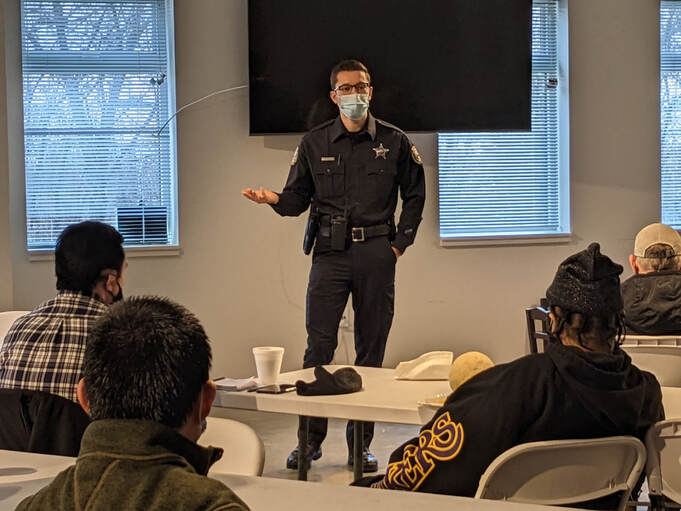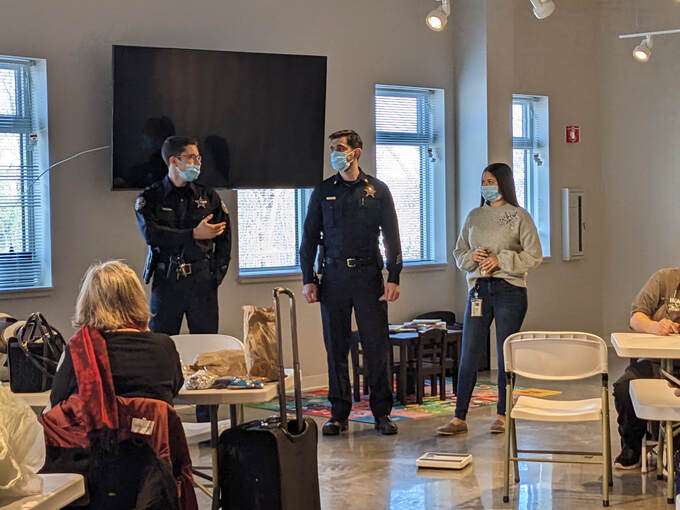|
By Roxanne Gentry, Marketing Associate To say that the relationship between people experiencing homelessness and the police can be tense is something of an understatement. Across the nation there are laws on the books that penalize day-to-day life for many unhoused people. For instance, a law passed in Missouri in 2022 that went into effect at the beginning of this year prohibits sleeping in public spaces. There are also plenty of laws that make it illegal to sleep in cars, panhandle, and even to be vagrant. According to the RAND Corporation, the police are often the only contact that people experiencing homelessness have with the government. In recent years, many local governments and police departments have recognized the need to revisit traditional policing methods that often punish people experiencing homelessness – methods that are proven to be ineffective. The Palatine Police Department is among the trailblazers in law enforcement working not only to improve their relationship with people experiencing homelessness in our community, but also to be a resource on the path towards independence and permanent housing. I spoke with Officer Nick Heuertz, called Officer Nick here at JOURNEYS, who is a Crime Prevention Officer with the Palatine Police Department and a JOURNEYS Board Member. The Palatine Police Department, Officer Nick tells me, has had a “long-standing and very positive relationship” with JOURNEYS, thanks in no small part to the work of Alan Stoeckel, retired Palatine Police Chief and former JOURNEYS Board Member. When Chief Stoeckel retired from the force, he passed on his board seat to Officer Nick to help maintain the decades-long relationship between the two organizations. The Palatine Police Department continues to cultivate its relationship with JOURNEYS and its clients. The Crime Prevention Unit in partnership with the Neighborhood Based Policing Program worked with JOURNEYS to develop a four-part series of talks geared towards informing our HOPE Center clients about the police department’s goals and the resources available to them. Officer Nick began the series during the last week of March. He came to the HOPE Center and talked about how the Palatine Police Department actively strives to provide solutions at a grassroots level. “We want to meet them where they are,” Officer Nick says. “It’s important to address that some people experiencing homelessness may not have always had positive experiences with law enforcement officers. We think it’s really, really important that clients at JOURNEYS know the police department here in Palatine is here for them.” Over the next few weeks, more representatives from the Palatine Police Department will come to JOURNEYS. Next up is their new resident social worker, Kimberly Quintanilla, who will come to talk to clients about her role and what resources she provides. “As a clinician,” he explains, “she brings a totally different skillset, and has access to a lot of programs [we] don’t. We’re lucky to have her.” Then, a few patrol officers will stop by who work the area around JOURNEYS and in downtown Palatine. Officer Nick is hoping their visit will help build a connection between JOURNEYS clients and the officers they are most likely to encounter, especially when interactions between clients and police often occur on an enforcement basis when dispatch is called. Building familiarity will help build trust. Finally, JOURNEYS will host a visit from the Palatine Fire Department. Clients most often encounter the fire department during ambulance calls, which can be scary and overwhelming experiences. The Palatine Fire Department representatives will walk clients through the process – like taking blood pressure, blood oxygen level and heart rate – so that it seems less intimidating.
As an organization, the Palatine Police Department has ramped up its training on ways of engaging with people that will yield the best possible outcomes, including de-escalation and how to better interact with people with substance use disorders or experiencing mental health crises. We at JOURNEYS are lucky to have such a strong and enduring partnership with the Palatine Police Department. It is inspiring to work alongside an organization that advocates JOURNEYS’ mission to help people experiencing homelessness or are at risk of becoming homeless. For Officer Nick, a win is as small as getting a better outcome for one person at a time. “Acknowledging their humanity is important,” he says. “Homelessness is not someone else’s problem. It’s always very close to us.” JOURNEYS | Lives Here.
1 Comment
 Cliff is one of our newer board members, having come on late last year. I finally had an opportunity to sit down with him and ask him about what motivates him to help bring change in our shared community. We talked about an encounter he had with a homeless family in downtown Chicago that changed his perspective on homelessness, and how it's important to help others think past stereotypes of homelessness wherever it's found. "Before the pandemic, my family and I were in downtown Chicago, walking around the River North area. We stumbled across a family – a father and two sons – who were homeless. They were sitting outside of a grocery store. I said to my son, 'We need to help this family,' so we went inside and loaded up a cart with food. When we came back out, they were gone. It was about dinner hour, and, while I didn’t know this at the time, the area clears out of homeless people around then. In fact, we couldn’t find a single person in the area to give the food to. We ended up at Navy Pier and found a group of men who could benefit from the groceries, since we didn’t need them and wanted them to go to good use. That moment planted a seed in my mind. There are a lot of stereotypes of 'homeless people.' There’s this idea that they might have a drug problem or struggle with mental illness, or that they’re always looking for handouts. And, yes, some people experiencing homelessness do struggle with drugs and mental illness. But the reasons for homelessness sometimes aren’t as obvious. People don’t always 'fit' into our ideas of homelessness. They might be a family who hit hard times, or even the person you’re standing next to in line at the bus stop or grocery store. I want to help change that bias. If I had this bias, who else might, too? People experiencing homelessness are not lesser. I’m sure that there were other times in my life when I interacted with someone who was homeless, but I didn’t realize it because they didn’t fit the stereotype of what I thought homelessness was. It’s not just about asking, 'What did that person do to get there?' I feel as though we’re in a position to respond by thinking about how we can transition people back into stable lives. I’m a financial advisor, so I see my role in that potentially being able to encourage establishing savings accounts for emergency funds and help with budgeting – helping with basic needs. That’s something I can do now as we work to change minds in our larger community. I think it’s important that as a board, we work to change the way people think about homelessness." Transcribed and Arranged by Roxanne Gentry, Marketing Associate |
MissionOur blog contains original writing on issues related to homelessness, community happenings, and unique agency stories. Archives
June 2023
Categories
All
|
|



 RSS Feed
RSS Feed

